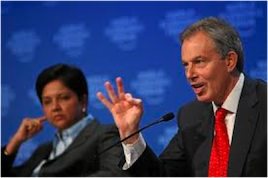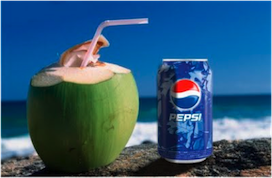UN Summit on Non-Communicable Diseases
Big Snack is making its moves


Indra Nooyi looking bored by Blair at a World Economic Forum meeting;
and choices of tropical drinks. One of them does not have a 'lifestyle' brand.
New York. Expect PepsiCo and other transnational companies to have a big impact before, during and after the UN summit on non-communicable diseases, to be held in New York this September.
PepsiCo is the biggest manufacturer of snack products in the world. If revenue is equated with national gross domestic product, PepsiCo would be the 75th 'nation' in a list of the world's biggest economies. Its chief executives can shift billions of dollars for strategic reasons. It is headquartered 22 miles north of New York City. PepsiCo chief executive officer Indra Nooyi (left, above), is close to US president Barack Obama. Its revenue is higher than the GDP of 40 African countries and several countries in Asia and the Middle East, all of whom as UN member states have votes at UN meetings.
PepsiCo investments in Asia, the Middle East and Africa have increased from $US 393 million in 2007 to $US 585 million in 2009. This has resulted in a 9 per cent growth in snacks volume, driven by 'double-digit' growth in India and the Middle East. Through the charitable PepsiCo Foundation, the company also has disbursed close to $US 4 million in grants during 2009 to organisations including the UN World Food Programme and Save the Children.
'It is reasonable to assume that heads of Asian, Middle Eastern and African states, and their advisors, will listen to what PepsiCo, and other colossal transnationals like Nestlé and Coca-Cola, have to say', says Association Council member Geoffrey Cannon. 'PepsiCo is already engaged with the UN system. The World Food Programme receives around $US 2 million from PepsiCo. This is only a few drops in the bucket of the Programme's annual $US 5 billion income, or from PepsiCo's 2009 $US 8.7 billion profit. But it burnishes Pepsi's image, and support like this can make a remarkable difference to UN policy making and decision taking. I think it is very likely that PepsiCo is getting its messages across to impoverished African UN member states, very clearly'.
The scale and scope of Pepsi
PepsiCo currently has an annual revenue of $US 43.3 billion. If the comparison is with national gross domestic product, this makes it level with Tunisia, Serbia and Sri Lanka, which are ranked in the middle 70s of the list of 181 countries.
African countries whose GDPs are lower than PepsiCo's revenue are (in descending order) Ethiopia, Kenya, Côte d'Ivoire, Cameroun, Tanzania, Uganda, Ghana, Zambia, Senegal, Equatorial Guinea, Botswana, Democratic Republic of the Congo, Gabon, Mozambique, Republic of the Congo, Namibia, Mali, Madagascar, Burkina Faso, Chad, Benin, Niger, Rwanda, Malawi, Zambia, Guinea, Togo, Mauritania, Swaziland, Central African Republic, Eritrea, Sierra Leone, Lesotho, Cape Verde, Burundi, Djibouti, the Gambia, Liberia, Guinea Bissau, São Tomé e Principe. These 40 UN member states all have votes in UN meetings. Many are much more focused on undernutrition and hunger, and major infectious diseases such as malaria, tuberculosis and HIV-AIDS, than obesity, or cardiovascular disease, cancer, and other chronic diseases.
The comparison between companies and countries is somewhat misleading, as PepsiCo chief executive officer Indra Nooyi explained in November, interviewed by New Delhi TV. She was accompanying US president Barack Obama on his Indian tour. She said: 'A company is much easier than running a country... when a CEO decides to enact a decision, we just do it. That's one of the wonders of running a private enterprise... Companies the size of PepsiCo is like running a little republic, there's no question about it... I have a board of directors that runs the country in the interests of the stakeholders.,,, And I'm not running for elections every two years. So I have a very different dynamic, and when I say something, it is enacted in the company'.
PepsiCo's mission is 'To be the world's premier consumer product company focused on convenient foods and beverages'. 'They are teaching the world to snack', says Association Council member Fabio Gomes. Association Council member Carlos Monteiro adds: 'PepsiCo comes from a US snacking culture. The company has been pushing other people and cultures to abandon their traditional way of eating and preparing food, and to follow the US snacking culture. As well as the cultural impact, the unrestricted growth of the transnational food industry in Africa is extremely harmful for local economies'.
A glimpse of Pepsi
PepsiCo states that it 'Offers the world's largest portfolio of billion-dollar food and beverage brands, including 19 different product lines that each generates more than $1 billion in annual retail sales. Our main businesses – Frito-Lay, Quaker, Pepsi-Cola, Tropicana and Gatorade – also make hundreds of other nourishing, tasty foods and drinks that bring joy to our consumers in more than 200 countries. With annualized revenues of nearly $60 billion, PepsiCo's people are united by our unique commitment to sustainable growth, called Performance with Purpose. By dedicating ourselves to offering a broad array of choices for healthy, convenient and fun nourishment, reducing our environmental impact, and fostering a diverse and inclusive workplace culture, PepsiCo balances strong financial returns with giving back to our communities worldwide'.
As one example of Pepsi’s brand range, Frito-Lay brands include Baken-ets, Barcel, Bocabits, Cheese Tris, Cheetos, Chester's, Chizitos, Churrumais, Cracker Jack, Crujitos, Doritos, Fandangos, Fritos, Funyuns, Gamesa, Go Snacks, James' Grandma's Cookies, Hamka's, Hostess, Kurkure, Lay's, Miss Vickie's, Munchies, Munchos, Ollie's Meat Snacks, Quavers, Rold Gold, Ruffles, Rustler's Meat Sticks, Sabritas, Sabritones, Sandora, Santitas, Simba, Smartfood, The Smith's Snackfood Company, Sonric's, Stacy's Pita Chips, Sun Chips,Tor-tees, Tostitos,
Walkers, Wotsits.
The PepsiCo 2009 annual report shows that after the US, their biggest source of net revenue comes from Mexico, where they earned $US 3.2 billion that year. In Mexico and many other countries, PepsiCo and other Big Snack companies are opposing regulatory actions, including that announced by the Public Education Secretary of Mexico, Alonso Lujambio, designed to ban junk products from elementary schools. Association founder member Juan Rivera, director of the Centro de Investigación en Nutrición y Salud (at the National Institute of Public Health, part of the Mexican Ministry of Health) has worked with the Mexican government to get food and drink at schools regulated. In his experience ‘'industries are very resistant to making changes on labelling and reducing portion size, especially on soft drinks’. For this and other reasons he advocates that ‘the Government should implement the statutory strategy to promote water, and fresh fruits and vegetables'.
On last 26 October Derek Yach, PepsiCo’s Senior Vice-President, Global Health Policy, addressed the Council on Foreign Relations in New York. The CFR, publisher of the journal Foreign Affairs, is a US global policy think-tank whose directors include former secretary of state Madeleine Albright and former treasury secretary Robert Rubin. They also include Donna Hrinak, former US ambassador to Brazil, Venezuela, Bolivia and the Dominican Republic, then US deputy assistant secretary of state for Mexico and the Caribbean, and now a colleague of Derek Yach at Purchase NY as PepsiCo senior director for Latin American government affairs.
At the CFR meeting Derek Yach said: ‘Partnerships between PepsiCo, other food companies, companies from other sectors and government could have unprecedented magnifying effects in preventing NCDs. We need to move more boldly to build such
As a former executive director of the World Health Organization (WHO), he shaped WHO's first treaty on public health, the Framework Convention on Tobacco Control. He stands by strong regulatory actions in the tobacco control arena, and the Convention’s role in 'promoting demand reduction; stopping support for tobacco farming; and encouraging the use of tobacco excise taxes’. After leaving WHO, and during a brief stay at Yale University, he said of obesity, as quoted by Chris Mooney in his book The Republican War on Science: ‘I think the one thing that is emerging stronger and stronger is the role of soft drinks’. But he does not see an analogy between tobacco and soft drinks. As the current senior vice president, global health policy, at PepsiCo, there is, he said to the CFR last October that there is 'need to move from a demonization, tax and regulate approach that was followed with respect to the tobacco – to a multi-stakeholder approach that built on food industry expertise and capabilities’.
At another meeting in September, of the Consortium of Universities for Global Health He concluded with a rallying call: ‘Now is the time to get organized for next year’s Summit. Academia and researchers, food and other industry leaders: now is the time to start thinking about what your role is so we can put the strongest data, ideas and commitments on the table and have a strong clear voice at the UN Summit next year’. Meaning, now, this year.






